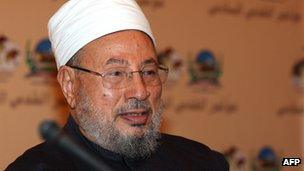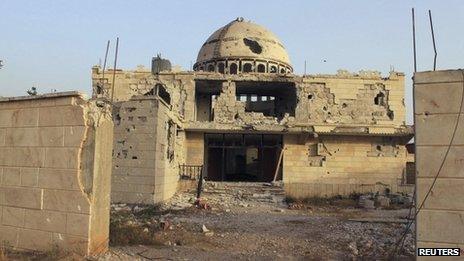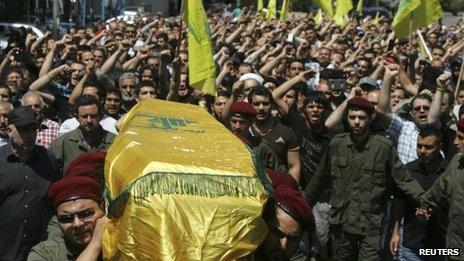Syria conflict: Cleric Qaradawi urges Sunnis to join rebels
- Published

Sheikh Qaradawi has about 60 million followers for his religious programme on al-Jazeera TV
An influential cleric has called on Sunni Muslims from around the Middle East to go to Syria to join the battle against President Bashar al-Assad.
Sheikh Yusuf al-Qaradawi, an Egyptian Islamist based in Qatar, told a rally in Doha that every Sunni capable of fighting should support the rebels.
He also claimed Iran and the Lebanese Shia group Hezbollah, Mr Assad's main allies, wanted to exterminate Sunnis.
His call came as fighting continued for the control of the key town of Qusair.
Rebel-held parts of Qusair, which is situated between Homs and the Lebanese border, are effectively blockaded by government forces and Hezbollah fighters, reports the BBC's Jim Muir in Beirut.
Conditions inside Qusair are said to be dire, especially for civilians and wounded trapped there, our correspondent adds.
Activist Hadi says: "It's like hell inside Qusair"
Some civilians trying to flee are reported to have been killed. Activists said an entire family of seven were executed at Dabaa, just to the north of Qusair. The report could not be independently verified.
Reinforcements from the Free Syrian Army are reported to have managed to break through from the north-east to support the embattled rebel fighters.
Some Lebanese Sunnis have also crossed into Syria to fight alongside the rebels, who are drawn largely from Syria's majority Sunni community.
'Party of Satan'
Addressing a solidarity rally for Syria in Qatar's capital on Friday evening, Sheikh Qaradawi urged Sunnis throughout the region to follow suit and join the battle.
"Every Muslim trained to fight and capable of doing that [must] make himself available," he said.
"Iran is pushing forward arms and men, so why do we stand idle?"

Syria's Sunni community has been at the forefront of the revolt
Sheikh Qaradawi, who has about 60 million followers for his religious programme on al-Jazeera TV, also denounced Hezbollah, whose name means the "Party of God" in Arabic, as the "Party of Satan".
Hezbollah leader Hassan Nasrallah declared a week ago that the group had sent fighters to Syria to assist forces loyal to President Assad, and vowed to fight to the end to defeat the rebellion and defend Lebanon from jihadist extremists.
"The leader of the Party of Satan comes to fight the Sunnis... Now we know what the Iranians want... They want continued massacres to kill Sunnis," Sheikh Qaradawi told the rally.
Our correspondent says the call was a clear sign of how rising sectarianism between Sunnis and Shia threatens to tear the region apart.
The cleric used to be an advocate of rapprochement with the Shia and defended Hezbollah against other Sunni authorities.
Now, he said he regretted that, because he realised that there was no common ground between the two, because the Iranians, especially hardliners, just wanted to "devour" the Sunnis.
The fierce fighting in Qusair and other parts of Syria has raised concerns about the prospects of a peace conference proposed by the United States and Russia.

Hezbollah's leader has vowed to fight to the end to defeat the rebellion in Syria
On Friday, diplomats told the Guardian newspaper that the negotiations on a political solution to the conflict were almost certain not to take place in Geneva in early June as scheduled. They remained hopeful that they would go ahead, probably in July or August.
The main opposition alliance, the National Coalition, has ruled out taking part while civilians are being killed and "in the light of Hezbollah and Iran's militia's invasion of Syria".
US Secretary of State John Kerry meanwhile criticised Russia for agreeing to supply the Syrian military with advanced S-300 missile defence system.
"Whether it's an old contract or not, it has a profoundly negative impact on the balance of interests and the stability of the region," he said.
Russia has itself criticised the European Union's decision to allow its arms embargo on Syria to expire on Saturday to allow weapons to be sent to the opposition.
More than 80,000 people have been killed and 1.5 million have fled Syria since the uprising against Mr Assad began in 2011, according to the UN.